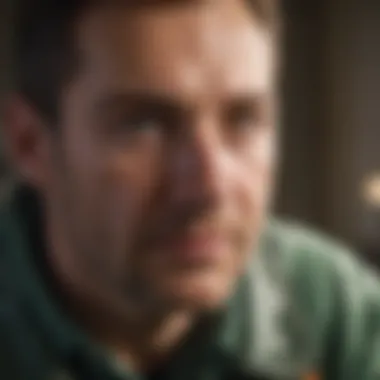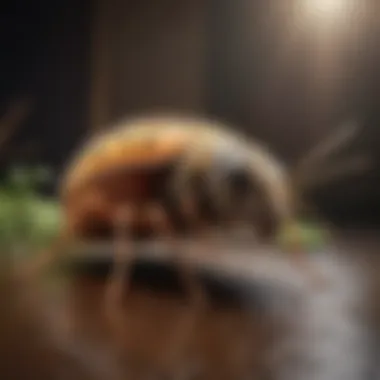Mason Exterminating: Expert Pest Control Solutions


Intro
Pest control is a critical aspect of maintaining a healthy home environment. It goes beyond mere annoyance; pests can carry diseases and cause structural damage. Understanding how to identify pests is a key first step in effective pest management. This article examines the expertise of Mason Exterminating. They provide comprehensive pest control solutions suitable for various needs.
The first section will cover Pest Identification, highlighting common pests that may invade homes, along with their signs and symptoms. Next, we will explore Prevention Strategies, detailing effective maintenance tips and natural methods to deter pests. Finally, we will look into Treatment Options, comparing chemical and natural treatments while providing guidance on DIY options for homeowners. Each section aims to inform householders on best practices for pest control and emphasize the importance of professional intervention.
Preamble to Mason Exterminating
Mason Exterminating plays a significant role in pest control services, providing strategies that protect homes and businesses alike from a range of pest issues. The pest control landscape is complex, with various methods and techniques available. Understanding the services offered by Mason Exterminating is essential for homeowners who wish to maintain a clean, healthy environment. Educating oneself about pest control can also influence choices regarding when to seek professional help versus managing issues independently.
Overview of Services
Mason Exterminating is known for its comprehensive range of services designed to tackle different pest problems. Their offerings include:
- Residential Pest Control: Focused on treating homes and ensuring that family living spaces are free from unwanted pests.
- Commercial Pest Control: Tailored solutions for businesses, considering different pest challenges that might affect operations and client relationships.
- Termite Control: Specialized services aimed at detecting and eliminating termite infestations, which can cause significant structural damage.
- Rodent Control: Effective strategies to address rodent issues, including traps and exclusion methods.
- Insect Control: Treatment plans for a variety of insects from ants to bedbugs.
This extensive service portfolio ensures that Mason Exterminating can respond to pest-related calls effectively, using approaches tailored to the type of pests and the location of the infestation.
Target Pests
To provide efficient pest control, it is crucial to understand which pests Mason Exterminating specifically targets. The most common pests include:
- Termites: Often considered silent destroyers, termites can cause severe damage to wooden structures if left unchecked.
- Rodents: Mice and rats are not only a nuisance but also pose health risks. They can contaminate food and spread diseases, making their control a priority.
- Various Insects: This category includes ants, cockroaches, wasps, and bedbugs. Each of these pests requires a distinct approach for effective eradication.
Recognizing these common pests helps homeowners identify potential problems early, making it easier to contact professionals like Mason Exterminating for intervention. Prompt action can save time and money in the long run.
Types of Pests Managed
Understanding the types of pests that Mason Exterminating manages is critical for homeowners. Recognizing specific pests helps residents take proactive measures in maintaining a safe and clean living environment. Each type of pest carries its own unique risks and requires tailored management solutions. Not all pest control companies may effectively handle all pests, so knowing what Mason Exterminating specializes in can significantly influence how well a problem is managed.
Termites
Termites are often referred to as "silent destroyers" because they can cause extensive damage to wooden structures and furniture without immediate signs of their presence. In fact, a colony of termites can consume a significant amount of wood within a short period. This makes early detection and intervention crucial. Mason Exterminating utilizes advanced techniques such as thermal imaging and moisture detection to locate termite infestations before they become severe. By relying on methods like baiting systems, they provide effective control while minimizing chemical usage.
Rodents
Rodents, including mice and rats, pose not only property damage risks but also health concerns. They have the potential to contaminate food and spread diseases. Their ability to reproduce quickly can lead to large populations, making timely management essential. Mason Exterminating utilizes a combination of trapping, baiting, and exclusion techniques to form a comprehensive strategy against rodents. Knowledge about rodent behavior informs these strategies, proving effective in preventing future infestations.
Insects
Insect pests encompass a wide array of species, from common household nuisances like ants and cockroaches to more severe threats like bed bugs. Each type requires distinct methods of control. For instance, the approach for treating bed bugs differs significantly from that of dealing with ants. Mason Exterminating approaches insect infestations with thorough inspections, thorough treatment plans, and continued monitoring. They focus on integrated pest management (IPM) practices that utilize both chemical and non-chemical measures to ensure effective control, reducing reliance on harsh chemicals while maintaining a pest-free home.
In summary, being knowledgeable about the types of pests managed by Mason Exterminating lays the groundwork for effective pest control. Homeowners can better appreciate the importance of proactive pest management when they understand the specific threats posed by termites, rodents, and insects.
Extermination Methods
Understanding the various extermination methods is integral to pest control. Mason Exterminating employs a range of techniques designed to effectively eliminate pests while considering safety and environmental impacts. Each method comes with its own set of advantages and considerations that can directly affect the efficacy of pest management. Homeowners should be aware of these methods when selecting a pest control solution. Proper knowledge enables informed decisions to achieve long-term pest management success.


Chemical Treatments
Chemical treatments are among the most traditional methods utilized in pest control. These treatments involve the application of synthetic or naturally-derived chemicals to manage pest populations. The main benefit of chemical treatments is their effectiveness and speed in eliminating infestations.
There are various formulations including sprays, baits, and granules, each designed for specific pests and situations. It's important to choose the right product and application technique, as improper use can lead to resistance and health hazards. Homeowners should also consider the potential impact on non-target organisms, particularly pets or beneficial insects. Always consult with a professional when using chemical solutions to ensure the procedure follows safety protocols.
Natural Solutions
Natural solutions have gained traction as an alternative to synthetic chemicals in pest control. These techniques include the use of diatomaceous earth, essential oils, or plant-based pesticides. The advantages of natural solutions often include lower toxicity and minimal environmental impact. Homeowners are attracted to these options for their perceived safety, especially in households with kids or pets.
However, natural solutions may take longer to show results compared to chemical treatments. Additionally, their efficacy can vary based on the type of pest and the method of application. Continuous application may be necessary to maintain effectiveness, and awareness of each product's capabilities is essential. Natural pest control can be a sustainable approach when integrated properly alongside other control methods.
Integrated Pest Management
Integrated Pest Management (IPM) is a comprehensive and strategic approach to pest control. It combines chemical, biological, and cultural methods to manage pest populations while minimizing risks to people and the environment. The focus is on prevention and monitoring, rather than just reaction.
Key components of IPM include:
- Regular Monitoring: Assessing pest activity and identifying potential problems early can prevent infestations.
- Cultural Practices: Adjusting the environment to make it less conducive for pests, such as proper waste disposal and maintenance of greenery.
- Physical Controls: The use of traps, barriers, or habitat manipulation to keep pests at bay.
- Targeted Chemical Use: If needed, applying chemicals selectively and in a manner that minimizes exposure to humans and beneficial wildlife.
IPM is preferred as it promotes a balanced ecosystem approach, reducing the reliance on chemicals while providing long-term solutions to pest problems. It aligns well with the objectives of Mason Exterminating when they address the unique needs of each client.
Prevention Techniques
Prevention is a cornerstone of effective pest control. It is always better to avert a problem than to deal with it after it has taken hold. By implementing robust prevention techniques, homeowners can significantly reduce the risks and implications of pest infestations. Understanding these methods fosters a proactive approach toward maintaining a pest-free home.
Home Maintenance Tips
Regular home maintenance is crucial in protecting one’s abode from potential infestations. Ensuring that windows and doors are properly sealed is a fundamental step. Cracks and openings can become entry points for pests seeking shelter. Furthermore, keeping gutters clean prevents water accumulation that can attract various insects.
Consider conducting routine checks on the roof and siding. Loose shingles or damaged siding can provide easy access to pests. Additionally, it is essential to store firewood away from the house to discourage pest inhabitants. This simple act minimizes the chances of insects migrating from the wood into living spaces.
Landscaping Strategies
Landscaping plays a significant role in pest prevention. Strategic planning can make a drastic difference in ensuring pests do not move closer to the home. Planting pest-repellent plants, such as marigolds or lavender, can deter insects naturally. These plants not only beautify your garden but also serve a functional purpose.
Maintaining a well-trimmed landscape is also key. Overgrown plants can offer shelter to pests, while accumulating debris can handle moisture, attracting rodents and insects alike. Creating a barrier, such as gravel or wood chips around the foundation, can further impede pests from making their way indoors.
Regular Inspections
Conducting regular inspections is a necessary practice for any homeowner dedicated to prevention. Inspections should ideally be thorough, focusing on both the interior and exterior of the home. Checking crawl spaces, attics, and basements often reveals early signs of infestations.
When inspecting the property, look for droppings or nesting materials, which indicate pest activity. It might also be beneficial to use pest monitoring tools or hire professional services for comprehensive assessments. By catching the problem early, homeowners can sidestep more significant issues down the road.
Technological Advancements
Technological advancements have transformed many industries, and pest control is no exception. In this section, we will explore how innovations are shaping pest management solutions at Mason Exterminating. These advancements not only improve effectiveness but also enhance safety and convenience for homeowners.
Smart Traps


Smart traps represent a significant leap forward in pest control technology. Traditional traps require regular monitoring. In contrast, smart traps use sensors to detect pest activity and can alert homeowners through a mobile app. This technology ensures timely responses to pest problems, reducing infestations before they escalate. Homeowners can manage traps remotely, saving both time and effort, and ensuring safety without the need for constant physical checks.
Monitoring Systems
Monitoring systems are designed to provide real-time data about pest activity in or around the home. These systems can include integrated cameras and temperature sensors that help track conditions conducive to pest infestations. By using monitoring systems, professionals at Mason Exterminating can quickly identify problem areas. As a result, they can take preventative action more efficiently. Homeowners gain peace of mind knowing that they are informed of pest movements and conditions that may encourage pest activities.
Data Analytics in Pest Control
Data analytics plays a crucial role in pest control strategies. Mason Exterminating utilizes data collected from smart traps and monitoring systems to analyze pest behavior and trends. This analysis allows for targeted interventions, meaning treatments can be customized based on actual pest activity rather than guesswork. This data-driven approach increases efficacy and reduces unnecessary treatments, ultimately minimizing chemical usage.
The integration of technology in pest control not only enhances effectiveness but also aligns with environmentally responsible practices.
The Role of Professional Exterminators
The significance of professional exterminators cannot be overemphasized in contemporary pest control practices. Mason Exterminating exemplifies the importance of skilled intervention, ensuring that pest problems are effectively managed. One primary aspect is the intricate knowledge that professionals possess. Trained exterminators are well-versed in the life cycles, habitats, and behaviors of various pests. This expertise allows for tailored approaches to extermination and management, leading to more successful outcomes.
The benefits of hiring professionals include efficiency and reliability. Many pest issues can escalate rapidly if not addressed promptly. Therefore, engaging a professional service ensures that these issues are handled quickly. Moreover, professional exterminators utilize advanced tools and methods not typically available to the general public. This increases the likelihood of comprehensive pest eradication.
Additionally, professionals provide peace of mind. Homeowners may attempt DIY methods, but often these solutions do not address the root cause of infestations. In contrast, specialists in pest control, like Mason Exterminating, have a systematic approach to eliminate pests and prevent future occurrences.
Expertise and Training
The expertise and training of exterminators are crucial elements in effective pest management. One of the defining aspects of their role is the extensive training that professionals undergo. This training encompasses understanding pest biology, chemical safe handling, and application techniques. It also extends to customer service, allowing exterminators to interact positively with clients while assessing their needs. Furthermore, ongoing education in new methods and technologies keeps professionals current in the field, adapting to changing pest behaviors and resistance patterns. This strong foundation in knowledge and skills ensures that pest control strategies are effective and environmentally responsible.
Safety Protocols
Safety protocols are another significant component of professional pest control. When applying chemical treatments or setting traps, safety for both the exterminators and residents is paramount. Mason Exterminating adheres to strict safety guidelines, ensuring that the well-being of family members and pets is protected during the treatment process. Training involves understanding proper protective gear, safe handling of chemicals, and knowing emergency procedures. Furthermore, exterminators must be aware of safe disposal methods for pest control products, minimizing environmental impact. Implementing these protocols fosters a safer pest management environment for everyone involved.
Customer Relations
Customer relations form the bedrock of a successful pest control business. Professional exterminators prioritize clear communication and building trust with their clients. This approach includes assessing pest issues thoroughly, explaining the recommended solutions, and providing education on preventive measures. Mason Exterminating excels in engaging with homeowners, addressing any concerns while offering professional insights. The trust established between exterminator and customer can lead to long-lasting relationships. Satisfied customers often return for follow-up services or refer friends and family, demonstrating that excellent customer relations directly contribute to success in the pest control industry.
"A well-informed customer is one who can actively participate in the pest management process, leading to stronger results."
Common Myths about Pest Control
Understanding the prevalent myths surrounding pest control is crucial for anyone looking to maintain a pest-free home. This awareness not only helps in making informed decisions but also debunks misconceptions that could lead to ineffective pest management strategies. Misinformation can cause homeowners to underestimate pest issues or overreact, leading to unnecessary costs or ineffective solutions. This section aims to clarify common myths versus the reality, providing valuable insights into pest control practices.
Myth vs. Reality
Several myths about pest control circulate among homeowners, which can significantly impact their approach to pest management. Below are some of the most frequent myths contrasted with the factual reality that underpins effective pest control.
- Myth 1: All pesticides are unsafe for home use.
Reality: While it is true that some pesticides can be dangerous if misused, many pest control products are specifically designed for safe use indoors. Professional exterminators know how to select and apply the right product without compromising health. - Myth 2: If I don’t see pests, I don’t have a problem.
Reality: Many pests live in hidden spaces, and their presence may not be immediately obvious. Regular inspections are essential to catch infestations before they become severe. - Myth 3: Professional pest control is too expensive and not worth it.
Reality: While there is an upfront cost, professional pest control can save money in the long run by preventing larger infestations and protecting your home from damage. - Myth 4: Natural remedies are always the best solution.
Reality: Although natural solutions can be effective, they might not penetrate all pest issues. In some cases, a combination of various methods, including professional treatments, is necessary for effective control. - Myth 5: Pest problems can be solved quickly.
Reality: Pest control often requires time and persistence. Multiple treatments and ongoing preventative measures are frequently necessary to ensure a comprehensive solution.
"Understanding the truth about pest control can significantly influence a homeowner's choices in managing these issues effectively."
Economic Considerations


The economic aspects of pest control play a crucial role in both planning and decision-making for homeowners. Understanding these considerations helps assess the value of investing in extermination services. Effective pest management is not just about immediate costs; it encompasses long-term financial implications for maintaining a house and its overall value. Ignoring pest issues can lead to more significant problems, resulting in higher expenses in the future.
Cost Analysis of Pest Control
When evaluating pest control solutions, it is essential to break down the costs involved. Factors influencing these costs include the type of pest being managed, the extent of the infestation, and the specific methods used for extermination.
- Initial Assessment: Many pest control companies, including Mason Exterminating, start with a thorough assessment of the property to determine the presence and type of pests.
- Treatment Options: Costs vary based on treatment. For instance, chemical treatments can be less expensive initially, but natural solutions might demand a higher upfront investment. Understanding both the short-term and long-term costs is vital.
- Frequency of Service: Some services may offer packages or contracts that benefit homes requiring ongoing treatments. This can be cheaper per treatment than opting for single, on-demand services.
Calculating these expenses helps individuals prioritize pest control measures, ensuring they allocate appropriate funds for effective treatments. Ultimately, investing in professional pest control can alleviate potential structural damages, which can be unmanageable down the line.
Long-term Savings of Prevention
Prevention is often seen as a more effective approach compared to reactive measures. By implementing preventative strategies, homeowners can potentially save significant amounts over time.
- Reduced Damage Costs: Pests such as termites can cause extensive structural damage, leading to costly repairs. Investing in preventive treatments can avoid these expenses altogether.
- Efficiency of Services: Preventive measures can lead to less frequent visits and treatment costs. For instance, regular inspections might catch infestations early, thus limiting the measures needed.
- Increased Property Value: A pest-free home not only enhances comfort but maintains property value. Homes with a history of pest issues might sell for less, impacting the homeowners' investment.
Consumer Recommendations
In the realm of pest control, the choice of a service provider and the evaluation of their services is crucial. Homeowners need to make informed decisions to ensure effective solutions for their pest problems. These recommendations help guide homeowners through this critical process in ways that foster confidence in their choices.
Choosing a Service Provider
When selecting a pest control company, there are several factors to consider to ensure quality service. First and foremost, check for licensing and certifications. A licensed company like Mason Exterminating indicates a level of professionalism and adherence to regulatory standards.
Next, gather customer reviews and testimonials. These resources provide insights into the company’s reliability and effectiveness. Look for companies with consistent positive feedback on their methods and results.
Additionally, consider the experience of the service provider. A well-established pest control service often means they have dealt with a wide range of pest issues and can customize their approach according to the specific needs of the home. Ask about their history in the industry, including their knowledge about local pest problems.
It's also essential to inquire about their methods. Understanding whether a company uses modern techniques or more traditional ones can directly impact the effectiveness and safety of their services. A good service provider should be transparent about their strategies and willing to answer any questions.
Check for guarantees or warranties. Good companies often provide some form of assurance that their services will meet certain standards. If problems persist after treatment, a reliable provider will revisit the site to address the issue without additional charges.
Evaluating Services Offered
After identifying potential service providers, evaluating their offerings is the next step in the decision-making process. Not all pest control services are created equal, and understanding the range of services available can aid in selecting the most suitable one.
Consider the types of pests they specialize in treating. For example, Mason Exterminating deals with a variety of pests, including termites, rodents, and insects. Make sure that their expertise aligns with your specific pest problem.
Evaluate the methods they employ. This includes not just the chemicals but also integrated pest management practices that consider environmental impacts. Look for companies that provide a mix of chemical and natural treatment options.
Additionally, assess the comprehensiveness of their service plans. A good pest control service should offer regular maintenance plans or follow-up visits, as ongoing management can be key to long-term pest prevention.
Review their customer service policy. Good communication is vital in this field, from the initial inquiry to follow-up after service. Determine whether they have a dedicated support line and what their response times are like in case of emergencies.
A careful examination of service providers and their offerings ensures homeowners make educated decisions for pest control solutions.
Ending
The conclusion of this article underscores the significance of understanding the complexities of pest control, particularly through the lens of Mason Exterminating. This pest control service has established a comprehensive approach that not only tackles existing pest issues but also emphasizes prevention and education for homeowners.
Final Thoughts
As we have discussed, the methods employed and the education offered by professional pest control teams are invaluable. Homeowners gain insights into specific pests, their behaviors, and effective solutions tailored to individual needs. Moreover, maintaining a pest-free home transcends merely handling infestations—it is about creating a sustainable environment where families can thrive.
In summary, by choosing Mason Exterminating, homeowners can access expertise in various pest control methods, economic considerations that factor into effective management, and professional guidance that fosters a collaborative partnership against pests. Understanding these dynamics enhances the peace of mind that comes from knowing one’s living space is protected, fostering a safe haven for all.



